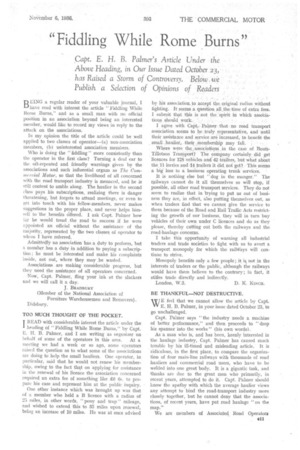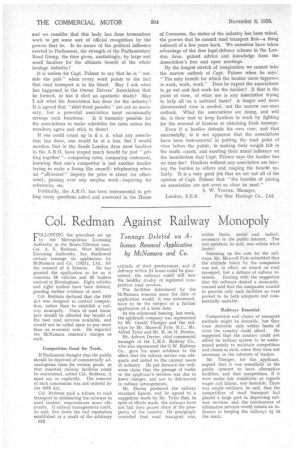"Fiddling While Rome Burns" B EING a regular reader of your
Page 49

Page 50

If you've noticed an error in this article please click here to report it so we can fix it.
valuable journal, I have read with interest the article " Fiddling While Rome Burns," and as a small man with no official position in an association beyond being an interested member, would like to record my views in reply to the attack on the associations.
In my opinion the title of the article could be well applied to two classes of operator—(a) non-association members, (b) uninterested association members.
Who is doing the "fiddling" more consistently than the operator in the first class? Turning a deaf ear to the oft-repeated and friendly warnings given by the associations and such influential organs as The Commercial Motor, so that the livelihood of all concerned with the road transport industry is menaced, and he is still content to amble along. The haulier in the second class pays his subscriptions, realizing there is danger threatening, but forgets to attend meetings, or even to get into touch with his fellow-members, never makes suggestions in the proper place, and never helps himself to -the benefits Offered. I ask Capt. Palmer how far he would tread the road to success if he were appointed an official without the assistance of the majority, represented by the two classes of operator to whom I have referred.
Admittedly an association has .a duty to perform, but a member has a duty in addition to paying a subscription; he must be interested and make his complaints inside, not out,, where they may be wasted.
Associations are making considerable progress, but they need the assistance of all operators concerned.
Now, Capt. Palmer, fling your ink at the slackers and we will call it a day.
J. BRADBURY (Member of the National Association of Furniture Warehousemen and Removers). Di dsbury.
TOO MUCH THOUGHT OF THE POCKET.
I READ with considerable interest the article under the heading of "Fiddling While Rome Burns," by Capt. E. II. B. Palmer, and I am writing as organizer on
behalf of some of the operators in this area. At a meeting we had a week or so ago, some operators raised the question as to what some of the associations are doing to help the small hauliers. One operator, in particular, said that he would not renew his membership, owing to the fact that on applying for assistance in the renewal of his licence the association concerned required an extra fee of something like £6 Os. to prepare his case and represent him at the public inquiry.
One other instance which was brought up was that of a member who held a B licence with a radius of 25 miles, in other words, "pony and trap" mileage, and wished to extend this to 35 miles upon renewal, being an increase of 10 miles. He was at once advised
by his association, to accept the. original radius without fighting. It seems a question all„the time of extra fees. I submit that this is not the spirit in which assoCiatious should work: I agree with Capt.Palsner that no road transport association seems to he truly representative, and until their assistance and service are increased, to benefit the small .haulier, their membership may Where were the ,;associations in the case of BoutsTillotson Transport? The company certainly did get licences for 128 vehicles and 42 trailers, but what about the 11 lorries and -14 trailers it did not get? This seems a bigloss to a business operating trunk services.
It is nothing else but "dog in the manger." The railways cannot do it all themselves so will stop, if possible, all other road transport services. They do not seem to realize that in trying to put us out of business they are, in effect, also putting themselves out, as when traders find that we cannot give the service to them because of the Road and Rail TrafficActs restricting the growth of our business, they will in turn buy vehicles of their own under C licences and do as they please, thereby cutting out both the railways and the road-haulage concerns.
I take this opportunity of warning all industrial traders and trade societies to fight with us to avert a transport monopoly for which the rail,&ays will continue to strive.
Monopoly benefits only a few people ; it ig not in the interests of traders or the public, although the railways would have them believe to the contrary; in fact, it stifles trade directly and indirectly.
London, W.3. D. K. KINCII.
BE THANKFUL—NOT DESTRUCTIVE.
WE feel that we cannot allow the article by Capt. E. H. B. Palmer, in your issue dated October 23, to go unchallenged.
Capt. Palmer says "the industry needs a machine of better performance," and then proceeds to "drop his spanner into the works" (his own words).
As a man who is, and has been, keenly interested in the haulage industry, Capt. Palmer has caused much trouble by his ill-timed and misleading article. It is ridiculous, in the first place, to compare the organization of four main-line railways with thousands of road hauliers and commercial road users, who have to be welded into one great body. It is a gigantic task, and thanks are due to the great men who primarily, in recent years, attempted to do it. Capt. Palmer should know the apathy with which the average haulier views any attempt to bind the road-transport industry more closely together, but he cannot deny that the associations, of recent years, have put road haulage "on the map."
We are members of Associated Road Operators ell
and we consider that this body has done tremendous work to get some sort of official recognition by the powers that be. Is he aware of the political influence exerted in Parliament, the strength of the Parliamentary Road Group, the time given, unstintingly, by large and small hauliers for the ultimate benefit of the whole haulage industry?
It is useless for Capt. Palmer to say that he is " outside the pale" when every word points to the fact that road transport is in his blood. May I ask what has happened to the Owner Drivers' Association that he formed, or has it died an apathetic death? May I ask what his Association has done for the industry? It is agreed that "shirt-front parades" are not so necessary, but a powerful association must occasionally arrange such functions. Is it humanly possible for the associations to make schedules for rates unless the members agree and stick to them?
If one could count up in £ s. d. what any association has done, one would be at a loss, but I would mention that in the South London Area most hauliers in the A.R.O. have reaped much benefit by just "getting together "—comparing rates, comparing customers, knowing that one's competitor is just another haulier trying to make a living like oneself ; telephoning when an " all-round " inquiry for price is about (or otherwise), passing over any surplus work—inquiring for references, etc.
Politically,, the A.R.O. has been instrumental in getting many questions asked and answered in the House
of Commons, the status of the industry has been raised, the powers that be consult road transport first—a thing unheard of a few years back. We ourselves have taken advantage of the free legal-defence scheme in the London Area, gained advice and knowledge from the Association's free and open meetings.
By the longest stretch of imagination we cannot take the narrow outlook of Capt. Palmer when he says: "The only benefit for which the haulier cares tuppence is work, work, work." Does he expect the associations to go out and find work for the haulier? If that is the point of view, of what use is any association trying to help all on a national basis? A longer and more disinterested view is needed, not the narrow one-man outlook. What the associations are doing, and will do, is their best to keep hauliers in work by fighting for the renewal of licences or •obtaining fresh tonnage.
Even if a haulier defends his own case, and that successfully, is it not apparent that the associations have been instrumental in putting the road point of view before the public, in making their weight felt in the traffic courts, and exerting their moral influence on the bumbledom that Capt. Palmer says the haulier has no time for? Hauliers without any association are leaving the burden to others and reaping the benefit unfairly. It is a very good job that we are not all of the opinion of Capt. Palmer that "the benefits of joining an association are not even as clear as mud."
S. W. VINTER, Manager,
London, S.E.8. For Star Haulage Co., Ltd,












































































































